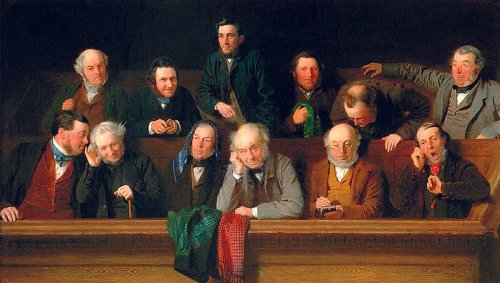
Some states permit less-than-unanimous jury verdicts in criminal cases. If a person is convicted of a crime in such a state by a jury that splits, say, nine to three, then has the defendant’s guilt been proved beyond a reasonable doubt? Does the mere existence of outvoted jurors (or their doubts) establish a reasonable doubt that should overturn the majority’s vote to convict? In Johnson v. Louisiana, 406 U.S. 356 (1972), the Supreme Court faced this question and held that it does not; even a split jury can convict a person beyond a reasonable doubt. But in Johnson, the Supreme Court was itself split as much as it could be, five to four. Is there a reasonable doubt as to what constitutes reasonable doubt?
— Peter Suber, The Paradox of Self-Amendment, 1990
